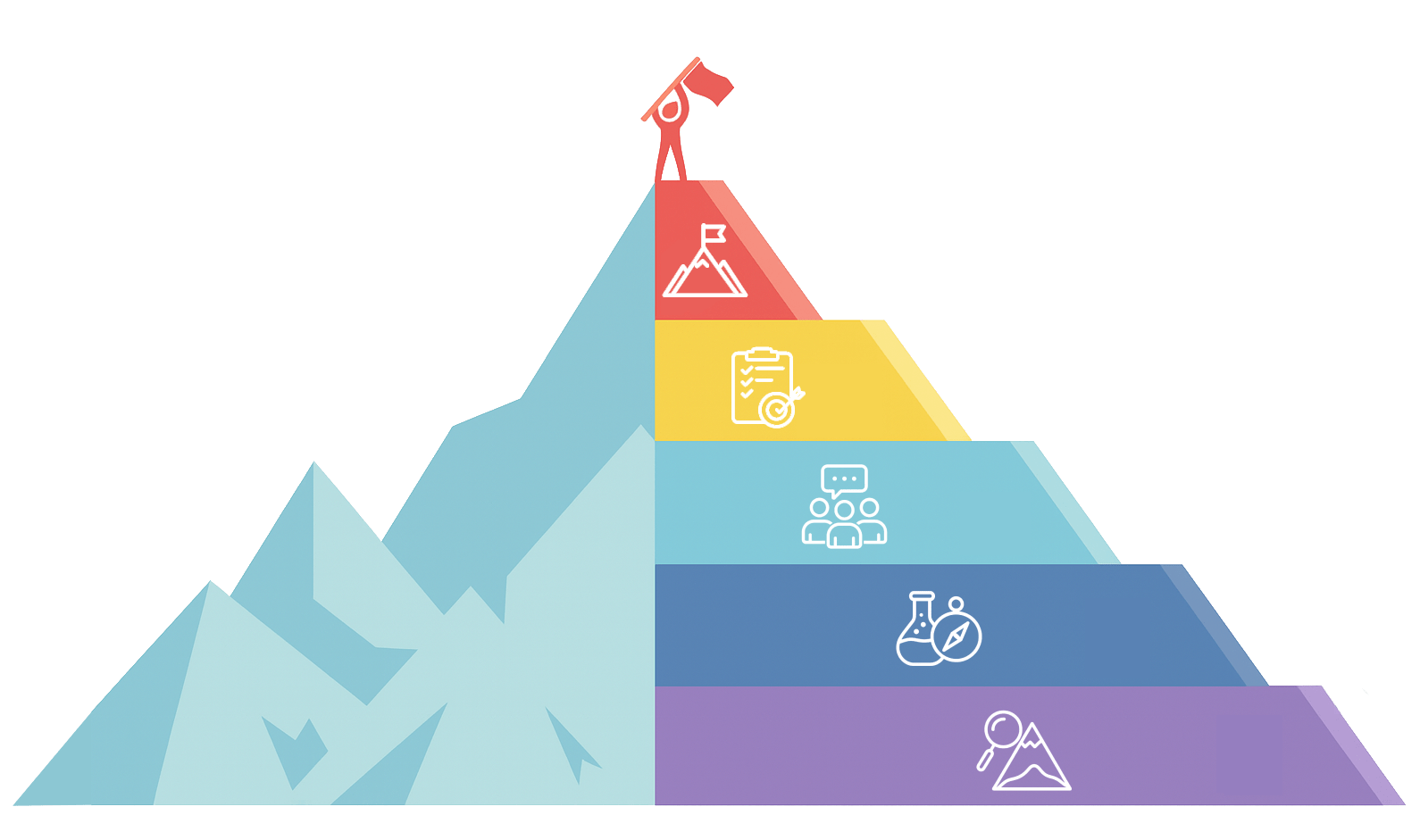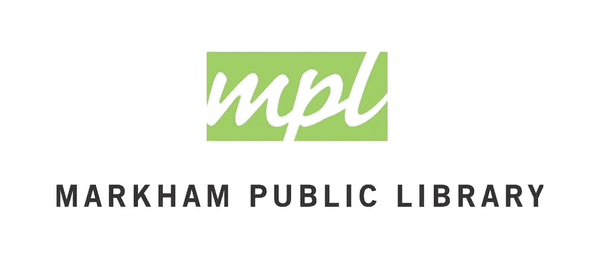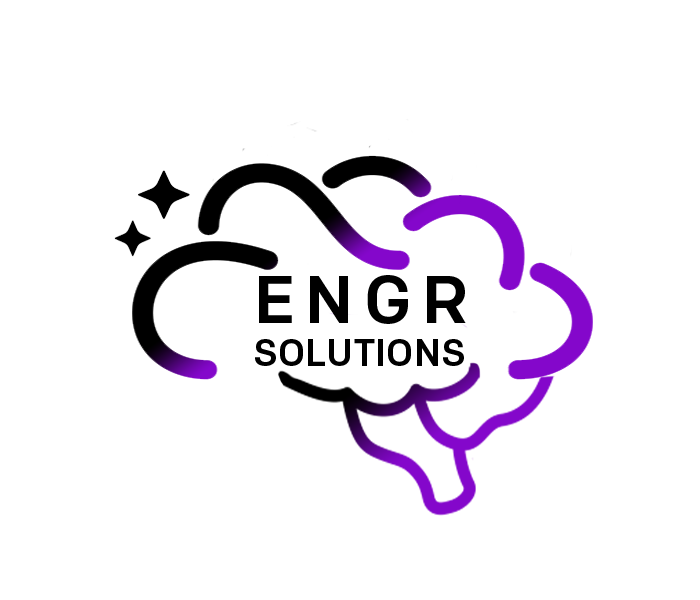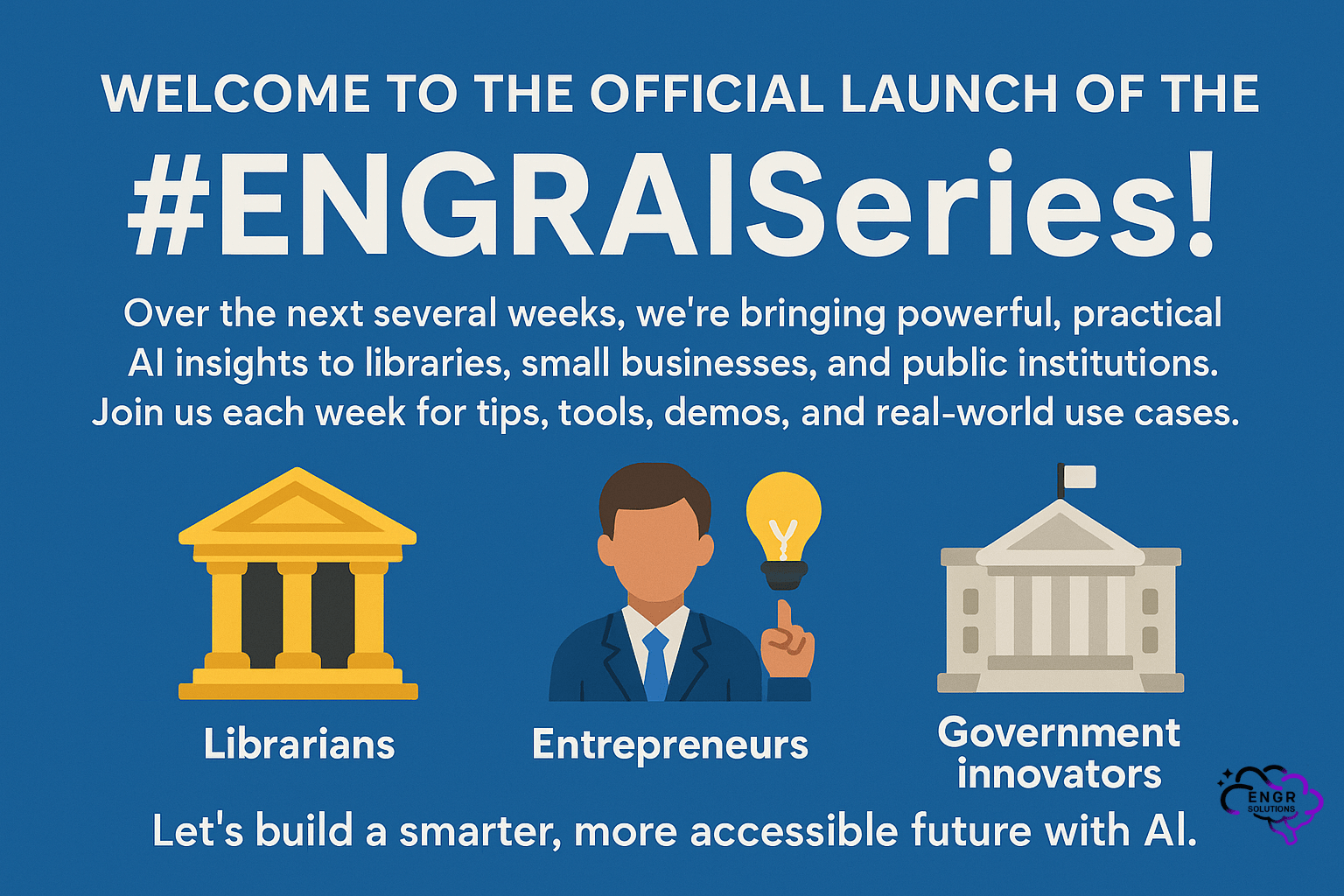ENGR Solutions PRESENTS
Mount AI
A mental model for libraries to understand and implement Artificial Intelligence.

Start Your Ascent
This model breaks down the journey into manageable stages, from initial awareness (Level 0) to full integration. Each level builds upon the last, ensuring a steady and strategic climb.

Level 1: Awareness, Explore & Learn
This foundational stage is all about building awareness and demystifying AI.

Level 2: Experimenting & Define Vision
The focus shifts from passive learning to active, low-risk experimentation.

Level 3: Staff Training & Community Engagement
Scale to conversations with the public and education of entire staff.

Level 4: Run a Pilot & Refine AI Policies
Testing a specific AI application in a controlled way to gather data on its effectiveness and impact.

Level 5: Operational Excellence
AI is no longer a special project but is thoughtfully integrated into the library’s standard operations.
Start Your Ascent Today
ENGR Solutions team will walk you through initial awareness (Level 0) to full integration. Each level builds upon the last, ensuring a steady and strategic climb.
Level 1: Basecamp
Explore & Learn
Explanation of the Step: This foundational stage is all about building awareness and demystifying AI. The goal is to cultivate curiosity and establish a baseline understanding of what AI is (and isn’t) without the pressure of implementation. It involves exploring basic concepts, learning key terminology, and observing how AI is already affecting the information landscape.
Suggested Next Steps:
- Form an AI Explorers Group: Assemble a small, voluntary group of staff from different departments to meet regularly, share interesting articles or tools, and discuss AI concepts in a low-pressure environment.
- Curate Foundational Resources: Create a shared digital space (like a folder or a simple webpage) with introductory videos, articles, and glossaries about AI, tailored for library professionals.
- Host a “Show and Tell”: Encourage staff to experiment with publicly available AI tools (like Gemini, Copilot or ChatGPT) for simple tasks and share their findings and impressions with the explorers group.
Level 2: Foothills
Experiment and Define Vision
Explanation of the Step: Here, the focus shifts from passive learning to active, low-risk experimentation. By testing AI tools on internal, non-public-facing tasks, the library can gain practical experience, identify potential benefits and challenges, and begin to envision how AI could align with its mission. This hands-on approach is crucial for developing an informed strategy and AI Policy.
Suggested Next Steps:
- Identify Low-Stakes Use Cases: Choose simple administrative tasks to test AI on, such as summarizing meeting minutes, drafting internal announcements, or generating ideas for social media posts.
- Begin Drafting a Vision Statement: Start a collaborative document to answer the question: “How could AI help us better serve our community and fulfill our mission?” This is the first step toward a formal strategy.
- Experiment with Small Scale Staff Training: Develop a small scale internal staff training for select team members to develop foundational AI skills and tools to build more institutional awareness.
Level 3: Mid-Base
Staff Training and Community Engagement
Explanation of the Step: This level is about scaling up knowledge from the small explorer group to the entire staff and beginning the conversation with the public. Empowering staff with formal training ensures a consistent understanding and builds the confidence needed to eventually guide patrons. Initial community engagement focuses on education and dialogue, positioning the library as a trusted guide in this new technological space.
Suggested Next Steps:
- Develop Foundational AI Literacy Training: Create a mandatory but accessible training module for all staff covering AI ethics, common tools, and how to talk about AI with patrons.
- Host a Public “Intro to AI” Workshop: Organize a workshop for the community that explains AI in simple terms, demonstrates common tools, and discusses its societal impact.
- Create a Patron-Facing AI Resource Guide: Develop a simple one-page handout or webpage listing trusted resources, definitions, and tips for patrons curious about AI.
Level 4: Ascent
Run a Pilot & Refine AI Policies
Explanation of the Step: This is where the library formalizes its approach. A defined pilot project allows for testing a specific AI application in a controlled way to gather data on its effectiveness and impact. An advisory board brings in diverse community and expert perspectives, while formal policies create essential guardrails for the ethical and responsible use of AI, refining the initial strategy with practical experience.
Suggested Next Steps:
- Define and Launch a Pilot Project: Select a single, measurable public-facing service to enhance with AI (e.g., using a chatbot for after-hours reference questions for one month) and define what success looks like.
- Establish an AI Advisory Board: Invite a diverse group of community members, staff, and local tech or ethics experts to provide guidance on the library’s AI strategy and policies.
- Draft an AI Principles & Ethics Policy: Using guidance from the Canadian Urban Libraries Council and other professional organizations, create a foundational document that outlines the library’s values and principles for using AI.
Level 5: Summit
Operational Excellence
Explanation of the Step: At the summit, AI is no longer a special project but is thoughtfully integrated into the library’s standard operations. The organization has established processes, policies, and a culture of continuous learning to manage AI tools effectively. AI is used to enhance services, improve staff efficiency, and empower the community, all in alignment with the library’s core mission and values.
Suggested Next Steps:
- Integrate the Successful Pilot: If the pilot project was successful, develop a plan to make it a permanent, supported part of the library’s services.
- Establish a Regular Review Cycle: Create a formal process to periodically review the library’s AI tools, policies, and their impact to ensure they remain effective and aligned with community needs and ethical standards.
- Develop Advanced AI Training: Offer specialized training for staff in specific roles, such as using AI for collection development analysis, advanced reference services, or marketing.
Reach the summit by integrating AI to better serve your community.

Case Studies
Staff Training
Train the Trainer
For Markham Public Library Staff
Staff Training
BPL AI Training
For Burlington Public Library
Community Education
Markham AI Series
For Markham Library and Small Businesses
AI Operations
AI Quiz Generation
For American Association for Anatomy
Testimonials
“Before working with ENGR Solutions, our library had no standardized approach to AI integration. Their comprehensive training program transformed our capabilities – not only did our staff’s comfort with AI tools increase significantly, but we’re now equipped to train others and serve our community better.”
“I loved learning about how AI can grow with you can start to work with you and your style. The more you use it, the more you can learn about it and vice versa.”
“I think [AI] is a very versatile tool and can enhance various elements of the library. It can help with cataloguing and metadata, recommendations for customers, identify trends in customer behaviour and see where the library can improve.”
Clients scaling Mount AI



Insights
Generative AI
AI labsWhat is generative ai ?Generative AI is a form of artificial intelligence that can generate full text, images, visuals, analyses and reports...
A Call to Action for Canada’s Public Libraries: Leading the Nation in AI Literacy
ENGR SOLUTIONS Leading the Nation in AI LiteracyLast week, we were invited by the Canadian Urban Libraries Council (CULC) to speak with 40+ Chief...
Combatting AI Psychosis: The Library’s Role
AI SeriesCombatting AI Psychosis: The Library’s Role There’s a mental health phenomenon, thanks to the likes of ChatGPT: AI psychosis. Also called...
Week 3: Gen AI in the Public Sector: Trends, Risk, Opportunities
ENGR AI SeriesGen AI in the Public Sector: Trends, Risk, OpportunitiesGenAI in the Public Sector: Trends, Risks, and Opportunities Last week, we had...
Week 2: Why Every Library Needs an AI Strategy
ENGR AI SERIEsWhy every Library needs an ai strategyAI isn’t the future—it’s the present. Public libraries are at a crossroads. In an era shaped by...
Week 1: Welcome to the ENGR AI Series 🚀
Welcome to the official launch of the #ENGRAISeries! Over the next several weeks, we're bringing powerful, practical AI insights to libraries, small...
Embracing AI: The Path Forward for Suburban Cities Near Tech Hubs
AI labsEmbracing AI: The Path Forward for Suburban Cities Near Tech HubsIn the shadows of North American tech giants, suburban cities like Markham,...













